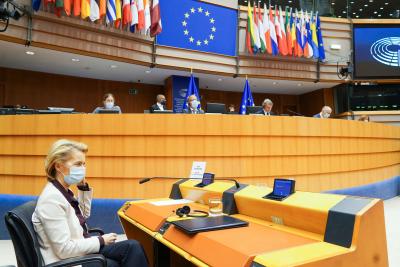Brussels, Oct 2 : The European Union (EU) has said it could impose sanctions on Turkey over “provocations and pressures” in a row with Greece over energy resources and maritime borders.
European Commission President Ursula von der Leyen called on Ankara to “abstain from unilateral actions” in the eastern Mediterranean. She spoke early on Friday during a meeting of EU leaders in Brussels, the BBC reported.
Earlier, Turkey and Greece set up a military hotline to try to reduce the risk of clashes in the region.
Tensions rose earlier this year when Turkey sent a ship into a disputed area to search for potentially rich oil and gas deposits.
Von der Leyen told reporters that the EU wanted “a positive and constructive relationship with Turkey and this would be also be very much in Ankara’s interest”.
“But it will only work if the provocations and pressures stop,” she said. “We therefore expect that Turkey from now on abstains from unilateral actions. In case of such renewed actions by Ankara the EU will use all its instruments and options available. We have a toolbox that we can apply immediately.”
After their late-night meeting, EU members agreed to review Turkey’s behaviour in December and impose sanctions if “provocations” had not stopped.
Austrian Chancellor Sebastian Kurz, posting on Twitter after the meeting, said: “The EU issues a clear threat of sanctions against Turkey should it continue to violate international law.”
European Council President Charles Michel said the EU was offering Turkey closer relations on trade and other areas but holding out the threat of sanctions if tensions in the Mediterranean did not de-escalate.
The European Union and Turkey have long held a fragile relationship.
Turkey has been a long-term candidate for membership of the EU but efforts have stalled. EU leaders have criticised Turkey’s record on human rights and the rule of law, in particular in the wake of the 2016 failed military coup.
Despite the strains, Turkey remains an important partner for the EU. Turkey hosts millions of migrants and struck a deal with the EU that limited the numbers arriving in Greece.
Greece and Turkey are both Nato members, but have a history of border disputes and competing claims over maritime rights.
Tensions flared in August when Ankara sent the research ship into an area south of the Greek island of Kastellorizo which is claimed by Greece, Turkey and Cyprus.
Disclaimer: This story is auto-generated from IANS service.

